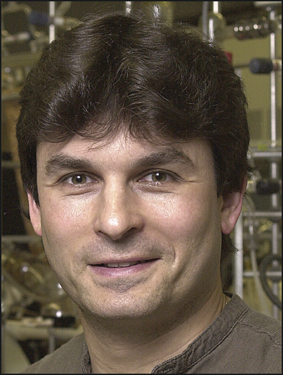
Richard B. Kaner, Department of Chemistry, University of California–Los Angeles, has received the 2015 Materials Research Society (MRS) Medal. He is cited “for the discovery of efficient methods to synthesize water dispersible conducting polymer nanofibers and their applications in sensors, actuators, molecular memory devices, catalysis, and the novel process of flash welding.” Kaner will be recognized during the award ceremony at the 2015 MRS Fall Meeting in Boston.
Kaner’s most important breakthrough came just 10 years ago while he was trying to develop a method to create high-surface-area polyaniline for use in sensors. He and his students developed an interfacial polymerization technique analogous to that used to produce nylon. However, while in the nylon reaction, the polymer remains at the interface between aqueous and organic phases. Kaner demonstrated that when polyaniline forms at the interface between an organic phase containing aniline and an aqueous phase containing oxidant and acid, the doped polyaniline created is hydrophilic and immediately goes into the aqueous phase. This results in nanofibrillar morphology with high surface area and excellent sensing properties. Nanostructured conducting polymers can now be made in a simple, easily reproducible process with inexpensive reagents.
Kaner then showed that by changing the acid used, polyaniline nanofibers could be made in different average diameters ranging from 30 nm to 120 nm. Next, he reported an even simpler synthetic route to conducting polymer nanofibers called rapid mixing. He demonstrated that nanofibers are stable indefinitely in water simply by controlling the pH and salt concentration. With this discovery, Kaner created stable water-based dispersions of pure polyaniline (i.e., polyaniline paints and inks that contain no surfactants).
Kaner started a company, Fibron Technologies, Inc., that demonstrated the efficient synthesis of conducting polymer nanofibers at the 100 L scale. These advances have now been taken over by Water Planet Engineering, which is developing advanced membranes for important separations such as cleaning up the oily water left after hydraulic fracturing (“fracking”) to recover oil. Future advances in processable conducting polymers developed by Kaner are anticipated to find applications in many products, including sensors, catalysts, and electronic devices.
Kaner has been recognized as a Distinguished Professor of Chemistry, University of California–Los Angeles (UCLA) (2012), Distinguished Professor of Materials Science and Engineering, UCLA (2012), has received the American Chemical Society Award in the Chemistry of Materials (2012), and is a Fellow of MRS (2011).


